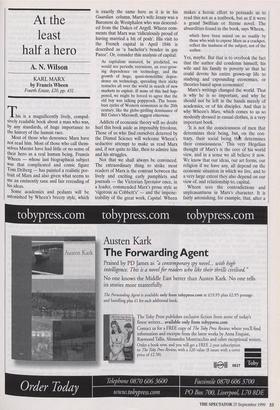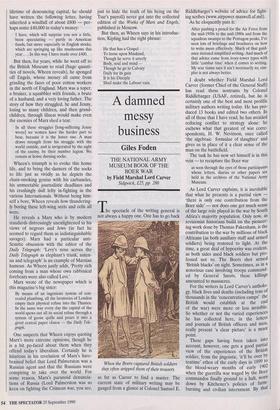At the least half a hero
A. N. Wilson
KARL MARX by Francis Wheen Fourth Estate, £20, pp. 431 This is a magnificently lively, compul- sively readable book about a man who was, by any standards, of huge importance to the history of the human race.
Most of those who denounce Marx have not read him. Most of those who call them- selves Marxist have had little or no sense of their hero as a real human being. Francis Wheen — whose last biographical subject was that complicated and comic figure Tom Driberg — has painted a realistic por- trait of Marx and also given what seems to me an eminently sane and fair rereading of his ideas.
Some academics and pedants will be astonished by Wheen's breezy style, which Is exactly the same here as it is in his Guardian column. Marx's wife Jenny was a Baroness de Westphalen who was descend- ed from the Dukes of Argyll. Wheen com- ments that Marx was 'ridiculously proud of having married a bit of posh'. His visit to the French capital in April 1846 is described as 'a bachelor's bender in gay Paree'. Or, consider this analysis of capital:
As capitalism matured, he predicted, we would see periodic recessions, an ever-grow- ing dependence on technology, and the growth of huge, quasi-monolithic depen- dence on technology, spreading their sticky tentacles all over the world in search of new markets to exploit. If none of this had hap- pened, we might be forced to agree that the old boy was talking poppycock. The boom- bust cycles of Western economies in the 20th century, like the globe-girdling dominance of Bill Gates's Microsoft, suggest otherwise.
Addicts of economic theory will no doubt hurl this book aside as impossibly frivolous. Those of us who find ourselves deterred by the Dismal Science will welcome Wheen's seductive attempt to make us read Marx and, if not quite to like, then to admire him and his struggles.
Not that we shall always be convinced. The extraordinary thing to strike most readers of Marx is the contrast between the lively and exciting early pamphlets and journals — the Victorian Spectator once, in a leader, commended Marx's prose style as `vigorous as Cobbett's' — and the impene- trability of the great work, Capital. Wheen makes a heroic effort to persuade us to read this not as a textbook, but as if it were a grand Swiftian or Sterne novel. The absurdities found in the book, says Wheen,
which have been seized on so readily by those who wish to expose Marx as a crackpot, reflect the madness of the subject, not of the author.
Yes, maybe. But that is to overlook the fact that the author did condemn himself, his wife and his family to poverty so that he could devote his entire grown-up life to studying and expounding economics, or theories based upon economics!
Marx's writings changed the world. That is why he is so important, and why he should not be left in the hands merely of academics, or of his disciples. And that is why Wheen's Marx, which comes to us so modestly dressed in casual clothes, is a very important book.
`It is not the consciousness of men that determines their being, but, on the con- trary, their social being diet determines their consciousness.' This very Hegelian thought of Marx's is the core of his world view, and in a sense we all believe it now. We know that our ideas, our art forms, our religion if we have any, all depend on the economic situation in which we live, and to a very large extent they also depend on our view of, and relationship to, capital.
Wheen sees the contradictions and unpleasantness in Marx's character. It is fairly astonishing, for example, that, after a lifetime of denouncing capital, he should have written the following letter, having inherited a windfall of about £800 — per- haps some £40,000 in today's money:
I have, which will surprise you not a little, been speculating — partly in American funds, but more especially in English stocks, which are springing up like mushrooms this year . . . In this way I have made over £400.
But then, for years, while he went off to the British Museum to read (huge quanti- ties of novels, Wheen reveals), he sponged off Engels, whose money all came from grinding the faces of poor cotton workers in the north of England. Marx was a toper, a bruiser, a squabbler with friends, a brute of a husband, and a very loving father. The story of how they struggled, he and Jenny, losing so many children, and then grand- children, through illness would make even the enemies of Marx shed a tear.
In all these struggles [long-suffering Jenny wrote] we women have the harder part to bear, because it is the lesser one. A man draws strength from his struggle with the world outside, and is invigorated by the sight of the enemy, be their number legion. We remain at home darning socks.
Wheen's triumph is to evoke this home life, and to bring the •darners of the socks to life just as vividly as he depicts the chain-smoking genius with his carbuncles, his unmeetable journalistic deadlines and his crashingly dull lefty in-fighting in the various Internationals. Without being him- self a bore, Wheen reveals how thundering- ly boring these left-wing sects and cells all were.
He reveals a Marx who is by modern standards distressingly unenlightened in his views of negroes and Jews (in fact he seemed to regard them as indistinguishable savages). Marx had a particular anti- Semitic obsession with the editor of the Daily Telegraph: 'Levy's nose serves the Daily Telegraph as elephant's trunk, anten- na and telegraph' is an example of Marxian humour. As Wheen justly adds, 'Pretty rich coming from a man whose own rabbinical forebears were also called Levi.'
Marx wrote of the newspaper which is this magazine's big sister: By means of an ingenious system of con- cealed plumbing, all the lavatories of London empty their physical refuse into the Thames. In the same way every day the capital of the world spews out all its social refuse through a system of goose quills and pours it into a great central paper cloaca — the Daily Tele- graph.
One suspects that Wheen enjoys quoting Marx's more extreme opinions, though he is a bit po-faced about them when they offend today's liberalism. Certainly he is hilarious in his revelation of Marx's hare- brained belief that Lord Palmerston was a Russian agent and that the Russians were conspiring to take over the world. For some reason, Marx's paranoid denuncia- tions of Russia (Lord Palmerston was so keen on fighting the Crimean war, you see, just to hide the truth of his being on the Tsar's payroll) never got into the collected edition of the Works of Man and Engels, published in Moscow.
But then, as Wheen says in his introduc- tion, Kipling had the right phrase:
He that has a Gospel To loose upon Mankind, Though he serve it utterly Body, soul and mind Though he go to Calvary Daily for its gain It is his Disciple Shall make the Labour vain.



























































































 Previous page
Previous page